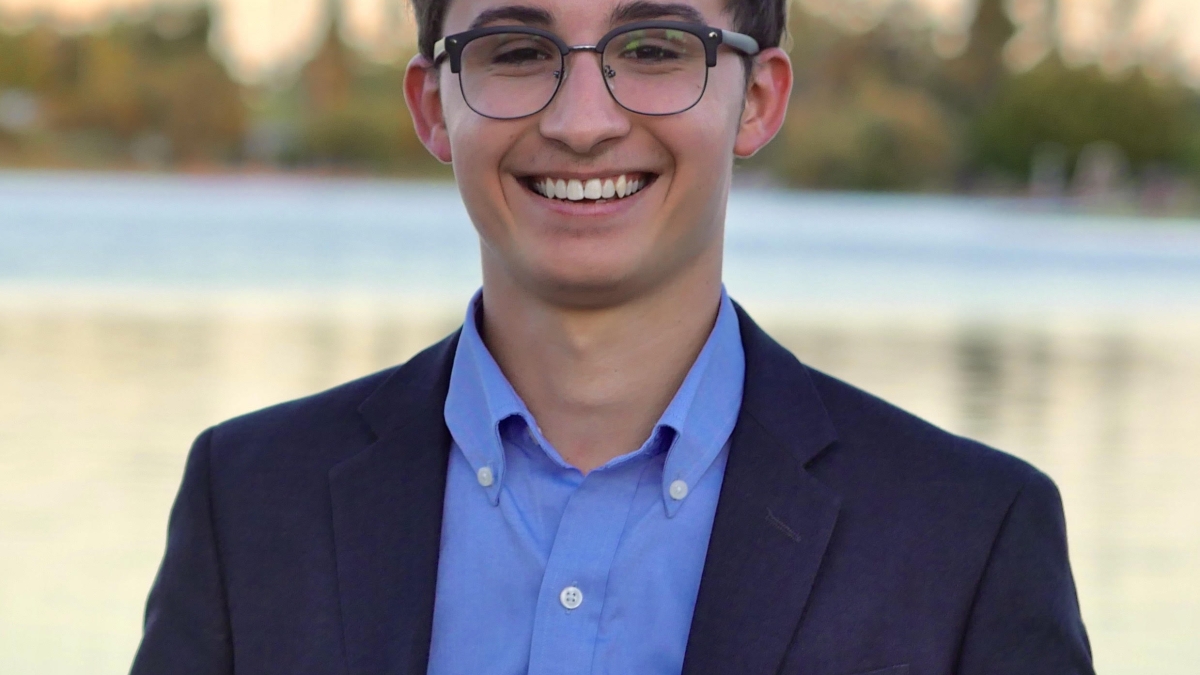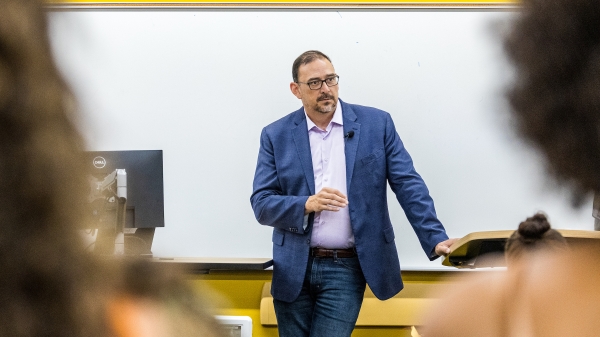Even with 3 majors, ASU grad still found time for political engagement

Among his many activities and accomplishments, Armando Montero was elected as the youngest ever member of the Tempe Union High School district governing board in 2020.
Editor's note: This story is part of a series of profiles of notable spring 2023 graduates.
Armando Montero is graduating with three degrees in political science, economics and mathematics with a focus in statistics. He is a student in Barrett, The Honors College as well as a 2022 Harry S. Truman Scholar representing Arizona. Throughout his undergraduate experience, he found multiple ways to get involved in political and community engagement.
In his first two years alone, he was involved in Undergraduate Student Government, the Refugee Education and Clinic Team (REACT), the Arizona Students Association ASU Chapter and ASU Young Democrats. He also took part in the SPGS Junior Fellows program with James Strickland and studied lobbying at the state and local level after taking POS 216 (State and Local Government), as well as an internship that entailed a collaboration between ASU and the Grand Canyon Institute to research the economic variables and policy solutions to the rise in discouraged workers in Arizona.
At the Arizona Students Association, Montero worked as a regional director, helping lead voter registration and youth engagement on ASU's campus. He was elected as the youngest ever member of the Tempe Union High School district governing board in 2020, and he was elected by school board members across the county to serve as the Maricopa County co-director on the Board of Directors of the Arizona School Boards Association in 2022. In 2021, he worked as a policy analyst on ASU’s Enterprise Policy Analysis Group, led by Max Goshert and housed in the Office of University Affairs.
The highlight of his time at ASU was being able to meet and learn from such a diverse group of students and professors all with various passions, skills and backgrounds.
Montero grew up in the Phoenix area and started at ASU immediately after finishing high school. He had planned to go out of state for college, but as he got closer to graduation he began to see all of the opportunities and resources ASU had to offer. As someone who ended up wanting to find ways to make a positive impact on the community he was raised in and having been involved with local politics for several years already, he said that ASU provided the best possibility to get a world-class, purpose-driven education that complimented the work he was able to continue to do in the surrounding community.
Question: What was your “aha” moment when you realized you wanted to study the field you majored in?
Answer: I began ASU just as a political science major, which I knew I wanted to pursue since my sophomore year of high school. I first got involved in local politics around that time, mostly around the issue of mental health in our K–12 public school system. After going through many of my own struggles at the beginning of high school and losing a friend of mine, I became more galvanized to raise awareness and work to create change at the local level. That started with volunteering on local campaigns and organizations as well as approaching the Tempe Union governing board at the time to prioritize mental health.
I first approached the board in 2018 with a group of students to write and introduce a resolution making mental health a priority and advocating for additional resources from the state. From there, I had the chance to work with leadership to find ways to increase student representation in the decision-making process, and it was these interactions that allowed me to see the positive impact that policymaking and the law can have on others' lives and how it can be a conduit to create real, lasting change.
Once I started at ASU, the classes I took made me realize the importance of other disciplines in order to better understand and analyze various concepts. That's when I decided to study economics, given that it went hand-in-hand with political science. It was then Dr. Derrick Anderson who challenged me to think outside the box through an honors contract for another way to create a cross-disciplinary approach to my education, which helped me settle on studying mathematics given not only the chance to bolster the quantitative skills for analysis in political science and economics (and vice versa) but to also take advantage of the logic-based thinking and other skills utilized in that field to combine ways to think and respond to complex issues from different perspectives.
Q: What’s something you learned while at ASU — in the classroom or otherwise — that surprised you or changed your perspective?
A: I think one of the most important things that I learned at ASU is that there are no bounds to what you can accomplish given the right amount of dedication, commitment and passion. As someone who struggled through much of high school, I would have never believed that I would be graduating with three degrees, let alone simultaneously running for and holding public office.
Always having the bigger picture in mind as well as the motivation and guidance from so many students and professors along the way helped push past the numerous (and sometimes seemingly insurmountable) challenges that came with pursuing this educational path and wading into the political field at a relatively young age. My time at ASU truly opened my eyes and motivated me to push beyond what we might traditionally think is beyond our reach and to not underestimate the impact that we as individuals can have.
Q: Why did you choose ASU?
A: I think ASU's overall philosophy and purpose-driven mission are what gravitated me towards attending here. ASU has taken the mantle of breaking down many traditional barriers and assumptions to education and takes seriously the drive to have a positive impact on the surrounding community and world. I truly believe ASU provided the structures and encouragement to pursue a cross-disciplinary education in three different fields, all while building the skills to simultaneously create a positive impact on the surrounding community through various roles. While there is often a stigma around state universities, ASU has broken it down and led the way to create a new frontier in higher education, and I was glad to see the impact of that during my four years here.
Q: Which professor taught you the most important lesson while at ASU?
A: While many professors contributed greatly to my time at ASU, I think the one that had the most profound impact on me was Derrick Anderson, who I had my first semester in PAF 340 (Contemporary Policy Challenges) and my last semester in PAF 547 (Science, Tech and Public Affairs). He was one of the first professors to really empower me to think outside of the box and challenge me to pursue three different degrees, which was a scary concept at the time. Just in the classroom, he taught me to think, contextualize and synthesize information in unique ways to take on complex challenges.
But beyond that, he truly took a vested interest in educational and professional careers while guiding and mentoring me throughout my time here at ASU. The lessons, connections and opportunities Anderson provided through the culmination of instruction and mentorship were integral to where I am today and where I'm headed in the future.
Q: What’s the best piece of advice you’d give to those still in school?
A: Take a step back and take advantage of the endless amount of resources, connections and opportunities that are available. The time goes by fast, and we often are so focused on the future that we miss the opportunities that are right in front of us. These four years are a unique opportunity to take risks, try something new and find what you are passionate about.
Q: What are your plans after graduation?
A: After graduation, I will be in Washington, D.C., for the summer with the Truman Foundation (still working on an exact intern location) and plan to take a gap year while working and continuing to serve on the Tempe Union governing board before starting law school at ASU's Sandra Day O'Connor College of Law in the fall of 2024. I hope to use these skills to then work in educational law.
More Law, journalism and politics

New report documents Latinos’ critical roles in AI
According to a new report that traces the important role Latinos are playing in the growth of artificial intelligence technology…

ASU's Carnegie-Knight News21 project examines the state of American democracy
In the latest project of Carnegie-Knight News21, a national reporting initiative and fellowship headquartered at Arizona State…

Arizona secretary of state encourages students to vote
Arizona Secretary of State Adrian Fontes looked right and left, taking in the more than 100 students who gathered to hear him…